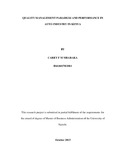| dc.description.abstract | By aligning corporate beliefs relating to quality, measurement, product positioning, product
design and key stakeholder with customer needs and expectations, an organization is
expected to accrue improvement in key performance indicators, namely productivity,
quality performance, cost effectiveness, timeliness and flexibility in its products and
services offered. This study sought to investigate quality management paradigm and its
effect on performance in auto industry in Kenya. By use of structured questionnaires, the
study sought to determine managerial Paradigms in operation in organizations studied and
corresponding productivity and quality performance. The study adopted a descriptive
research design in which a census was done on all the twelve organizations dealing in new
vehicle sales and after sales offers in Kenya. Stratified random sampling was used in this
study to select members of strategic management teams of these organizations for the
survey. Using primary data collected, the study employed descriptive statistics to analyze
the data obtained. Tabulation of data and use of pie charts was used in the analysis.
Correlation was then used to identify relationships between inherent paradigm indicators
and corresponding level of organizational performance as measured by performance
dimensions. From the study, it was observed that the auto industry in Kenya is dominated by
local franchises of multinational organizations, majority of whom subscribe to Quality
Management Paradigm. From the correlation analysis done, it was evident that
organizational performance, as measured by productivity, quality performance, cost
effectiveness, timeliness and flexibility is highly and positive correlated with managerial
paradigm, going by the high correlation coefficients. Organizations that subscribe to Quality
Management Paradigm were observed to accrue optimum productivity and quality
performance compared to those that subscribe to Traditional Paradigm. The study concludes with recommendations for future studies. | en |

